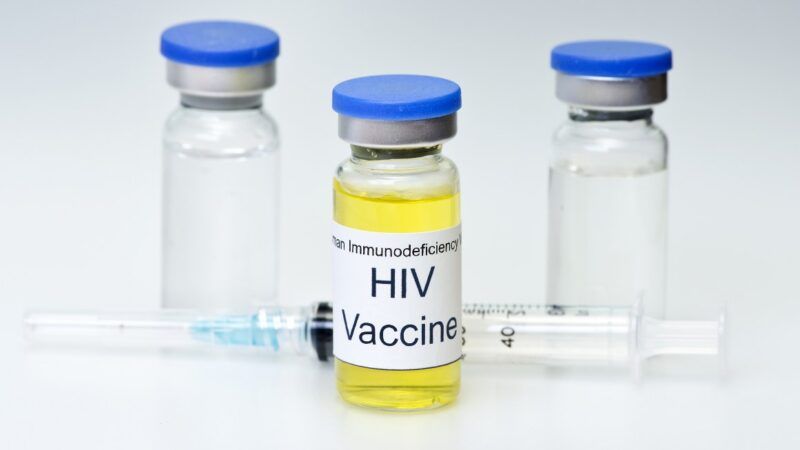Can the Medical Innovations Used To Fight COVID-19 Finally Defeat HIV?
Phase 1 testing begins on new vaccine based on mRNA advances.

The same type of medical innovations we've used to successfully fight COVID-19 are now being marshaled to possibly cure HIV once and for all.
Last week Moderna announced it was beginning a human clinical trial of a new, experimental HIV vaccine. The vaccine uses messenger RNA (mRNA) biotechnology, similar to the COVID-19 vaccines. The drug stimulates the recipients' white blood cells to produce antibodies to fight and neutralize invading viruses.
If the vaccine works, this would be a massive step toward eradicating HIV. Innovations in medicine have already mostly neutered a virus that at one point was killing more than 50,000 people a year in the United States.
Current treatments have been successful at suppressing HIV within a person's body to such a degree that virus levels could neither be detected nor transmitted. As a result, the close to 38 million HIV positive people across the world can live close to normal lives with the assistance of antiretroviral therapies. That itself is an amazing turnaround in the lives of infected people over the course of just three decades.
But this treatment isn't the same as a cure. These suppressive therapies require regular medication to keep HIV under control. Availability and access to regular drug treatments can be a challenge. Currently only 75 percent of people who are HIV positive are getting the treatment. Only two-thirds of HIV positive people have taken enough of the drug treatment that the HIV virus is fully suppressed in their own bodies. And so continued HIV transmission remains a problem, with 1.5 million new infections reported in 2020.
An mRNA-induced response could take the success in fighting HIV to the next level and possibly even eliminate it, much as science has purged the world of the scourge of polio.
That's if it succeeds, of course. Previous attempts at HIV vaccines have made it to clinical trials but ultimately failed. Nevertheless, as Reason's Ronald Bailey noted last May, advances in mRNA technology show great potential to fight viruses and diseases beyond just COVID. BioNTech, which worked with Pfizer to develop that company's COVID-19 vaccine, has started clinical trials to attempt to use mRNA vaccines to stimulate the body's immune systems to try to fight off different types of cancer.
It's far too early to celebrate, but it is very much worth recognizing the speed of medical innovation compared to what we experienced just decades ago.


Show Comments (97)